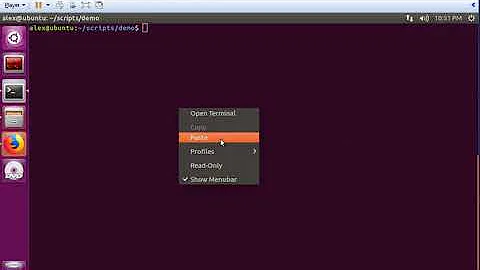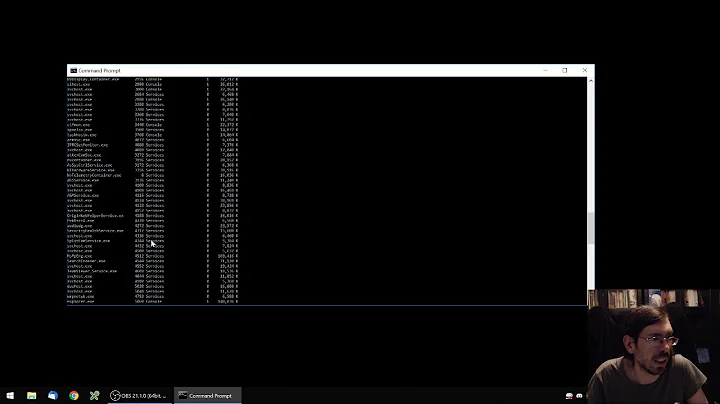netstat shows a listening port with no pid but lsof does not
Solution 1
From data you provided I'd say it's related to some NFS mounts or something using RPC.
you can check with rpcinfo -p for ports that might be used by some of RPC related services.
Here is how it looks on my system
# netstat -nlp | awk '{if ($NF == "-")print $0}'
tcp 0 0 0.0.0.0:55349 0.0.0.0:* LISTEN -
udp 0 0 0.0.0.0:18049 0.0.0.0:* -
# rpcinfo -p
program vers proto port
100000 2 tcp 111 portmapper
100000 2 udp 111 portmapper
100024 1 udp 10249 status
100024 1 tcp 10249 status
100021 1 udp 18049 nlockmgr
100021 3 udp 18049 nlockmgr
100021 4 udp 18049 nlockmgr
100021 1 tcp 55349 nlockmgr
100021 3 tcp 55349 nlockmgr
100021 4 tcp 55349 nlockmgr
Solution 2
Some processes/pids are only available to root. Try
sudo netstat -antlp
it should return the pid of every open port that's not in a TIME_WAIT state
or, if you want to know process ID related to specific port (let us say 8765 for example) use the code
netstat -tulpn | grep :8765
Solution 3
Based on hint from @user202173 and others I have been able to use the following to track down the process that owns a port even when it is listed as - in netstat.
Here was my starting situation. sudo netstat shows port with PID/Program of -. lsof -i shows nothing.
$ sudo netstat -ltpna | awk 'NR==2 || /:8785/'
Proto Recv-Q Send-Q Local Address Foreign Address State PID/Program name
tcp6 0 0 :::8785 :::* LISTEN -
tcp6 1 0 ::1:8785 ::1:45518 CLOSE_WAIT -
$ sudo lsof -i :8785
$
Now let's go fishing. First let's get the inode by adding -e to our netstat call.
$ sudo netstat -ltpnae | awk 'NR==2 || /:8785/'
Proto Recv-Q Send-Q Local Address Foreign Address State User Inode PID/Program name
tcp6 0 0 :::8785 :::* LISTEN 199179 212698803 -
tcp6 1 0 ::1:8785 ::1:45518 CLOSE_WAIT 0 0 -
Next use lsof to get the process attached to that inode.
$ sudo lsof | awk 'NR==1 || /212698803/'
COMMAND PID TID USER FD TYPE DEVICE SIZE/OFF NODE NAME
envelope_ 145661 145766 drees 15u IPv6 212698803 0t0 TCP *:8785 (LISTEN)
Now we know the process id so we can look at the process. And unfortunately it's a defunct process. And its PPID is 1 so we can't kill its parent either (see How can I kill a process whose parent is init?). In theory init might eventually clean it up, but I got tired of waiting and rebooted.
$ ps -lf -p 145661
F S UID PID PPID C PRI NI ADDR SZ WCHAN STIME TTY TIME CMD
0 Z drees 145661 1 2 80 0 - 0 exit May01 ? 00:40:10 [envelope] <defunct>
Solution 4
I don't know what these are specifically, but kernel modules (NFS for example) do not have a PID to associate with these sockets. Look for something suspect in lsmod.
Solution 5
I dont know if this can be useful. I had the same problem and what I did is the following: First, I called netstat with options -a(all) and -e(extended). With the latter option I can see the Inode associated to the used port. Then, I called lsof |grep with the inode number obtained and I got the PID of process associated to that inode. That worked in my case.
Related videos on Youtube
user3398902
Updated on September 18, 2022Comments
-
user3398902 almost 2 years
This question is similar to Network port open, but no process attached?
I've tried everything from there, reviewed the logs, etc... and can't find anything.
My netstat shows a TCP listening port and a UDP port without a pid. When I search lsof for those ports nothing comes up.
netstat -lntup Proto Recv-Q Send-Q Local Address Foreign Address State PID/Program name tcp 0 0 0.0.0.0:44231 0.0.0.0:* LISTEN - udp 0 0 0.0.0.0:55234 0.0.0.0:* -The following commands display nothing:
lsof | grep 44231 lsof | greo 55234 fuser -n tcp 44231 fuser -n udp 55234After rebooting, those "same" two connections are there except with new port numbers:
netstat -lntup Proto Recv-Q Send-Q Local Address Foreign Address State PID/Program name tcp 0 0 0.0.0.0:45082 0.0.0.0:* LISTEN - udp 0 0 0.0.0.0:37398 0.0.0.0:* -And once again, the lsof and fuser commands show nothing.
Any ideas what they are? Should I be concerned about them?
-
 CrazyTux over 2 yearsA given solution for the specific problem - serverfault.com/questions/1078483/…
CrazyTux over 2 yearsA given solution for the specific problem - serverfault.com/questions/1078483/…
-
-
user3398902 almost 13 yearsI did try to locally netcat to both ports and it displays nothing. For the tcp port, it closes if I type anything and then enter. The UDP one only closes if I press Ctrl+C. I have iptables in place, and it does not allow connections to those ports, so unless they are bypassing iptables, I can't imagine something is connecting to them.
-
user3398902 almost 13 yearslsmod returns nothing. This server is an NFS client. That is currently my #1 suspect.
-
user4250202 almost 13 yearsThat would explain why the client ports have changed after a new instance of the kernel.
-
user3398902 almost 13 yearsIt is a web server running apache and pretty much nothing else other than things like cron and syslog.
-
petrus about 11 yearsevery open TCP ports only with this command. UDP ports will not be shown.
-
Peter Hansen almost 10 yearsYou shouldn't have been downvoted as this is a totally legit answer. It helped me find a case where the other answers (using rpcbind or lsof) didn't help. (And yes, it was NFS.) Thanks!
-
 Ryan Walls over 9 yearsIf you have this problem and want to force nlockmgr to use specific ports, try this solution: fclose.com/39625/fixing-ports-used-by-nfs-server.
Ryan Walls over 9 yearsIf you have this problem and want to force nlockmgr to use specific ports, try this solution: fclose.com/39625/fixing-ports-used-by-nfs-server. -
SamB over 9 yearsHmm, I wonder why it doesn't assign a PID to the NFS client just so you can see what's up with that ... I guess that'd require it to have a worker thread or something?
-
manish Prasad over 5 yearsHave been searching for this solution for months now. thank you for this jem
-
Stefan Lasiewski over 4 yearsI've been looking for a solution like this for years. Thank you! One of the downsides here is that if an NFS client or server is bogged down, then
lsof | awk 'NR==1 || /212698803/'(even withlsof -Nto show NFS only) can be very slow to respond and may time out. Another downside is that the inode may change while you are troubleshooting this.




